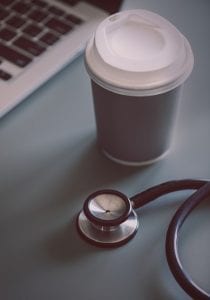Drink Some Joe To Get Out of the Red
Rosacea is a skin condition characterized by redness and often small, red, pus-filled bumps on the face. Over 3 million people are estimated to have rosacea and the signs and symptoms may flare up for a period of weeks to months and then diminish for a while. Rosacea can be mistaken for acne, an allergic reaction or other skin problems.
The cause of rosacea is unknown, but it could be due to a combination of hereditary and environmental factors. A number of factors can trigger rosacea by increasing blood flow to the surface of your skin. Some of these factors include:

Image courtesy of Pixabay
- Hot drinks
- Spicy foods
- Alcohol
- Temperature extremes
- Sunlight or wind
- Emotions
- Exercise
- Cosmetics
- Drugs that dilate blood vessels, including some blood pressure medications.
You are most likely to have rosacea if you:
- Are a woman
- Have fair skin, particularly if it has been damaged by the sun
- Are over age 30
- Smoke
- Have a family history of rosacea
New research suggests that, contrary to popular belief, drinking coffee might be a preventive treatment for rosacea. A national nurses’ study examined the rosacea risk and dietary habits of nearly 83,000 women, found that consuming caffeine from coffee may protect against the risk of developing rosacea. Coffee drinkers who consumed as little as 100 milligrams (mg) of caffeine a day saw a 4 percent drop in rosacea risk. An 8 ounce cup of coffee typically has about 95 mg of caffeine, and a venti Starbuck’s coffee has around 400 mg of caffeine.
Researchers are not sure why caffeine is beneficial to preventing rosacea, but possible reasons include an antioxidant effect or caffeine’s impact on hormones such as adrenaline and cortisol. Unfortunately, no other caffeinated beverage confers the same benefit as coffee for rosacea prevention. At this point, research only points to an association, not causation, so no recommendations for coffee consumption have been made.
There is likely going to be further research into the association between rosacea and coffee, so stay tuned!

















